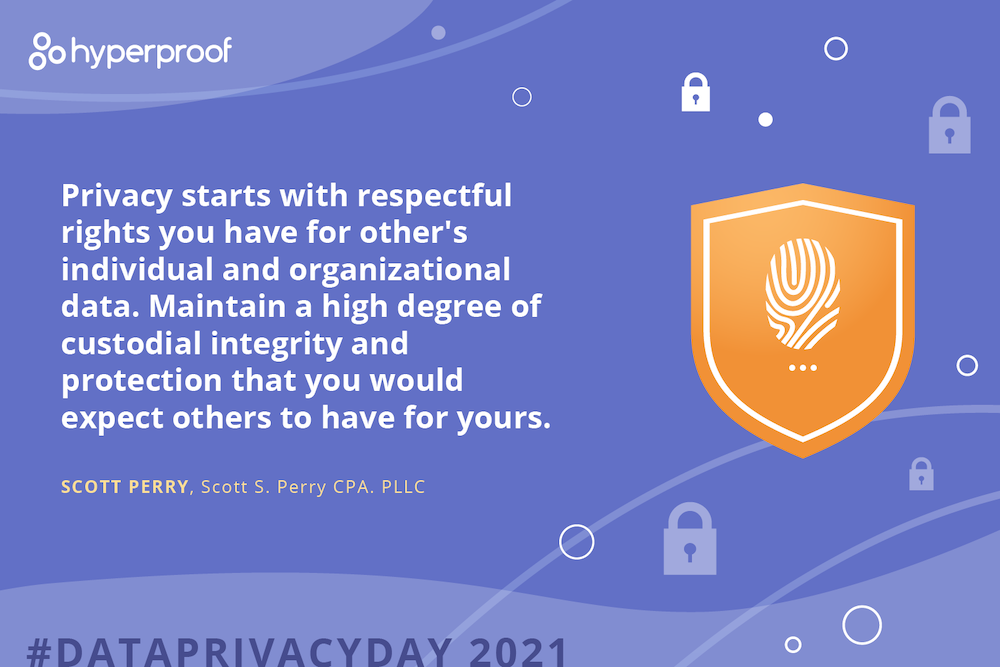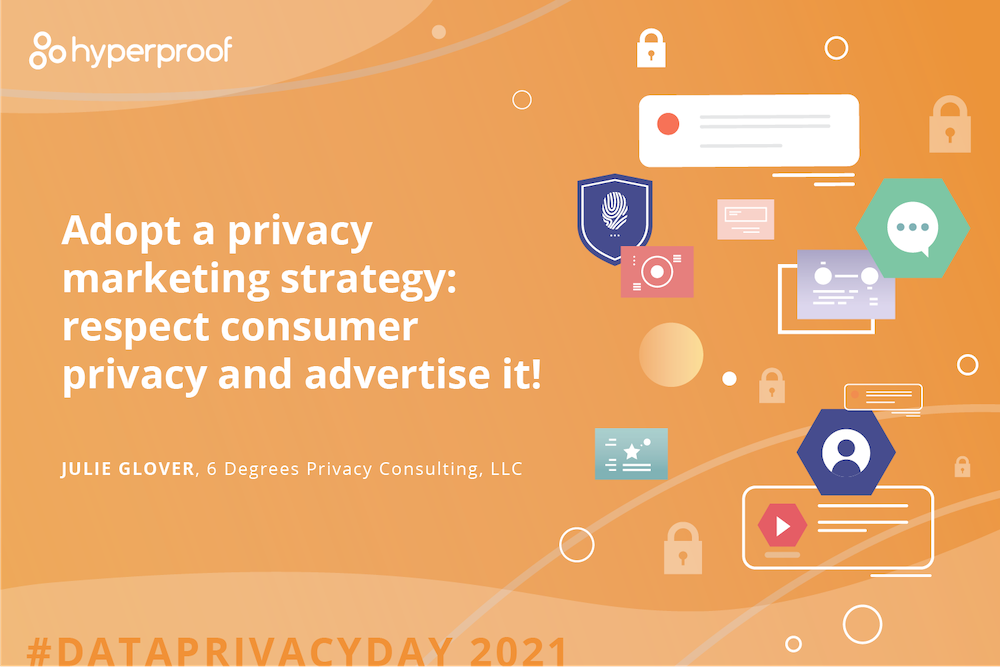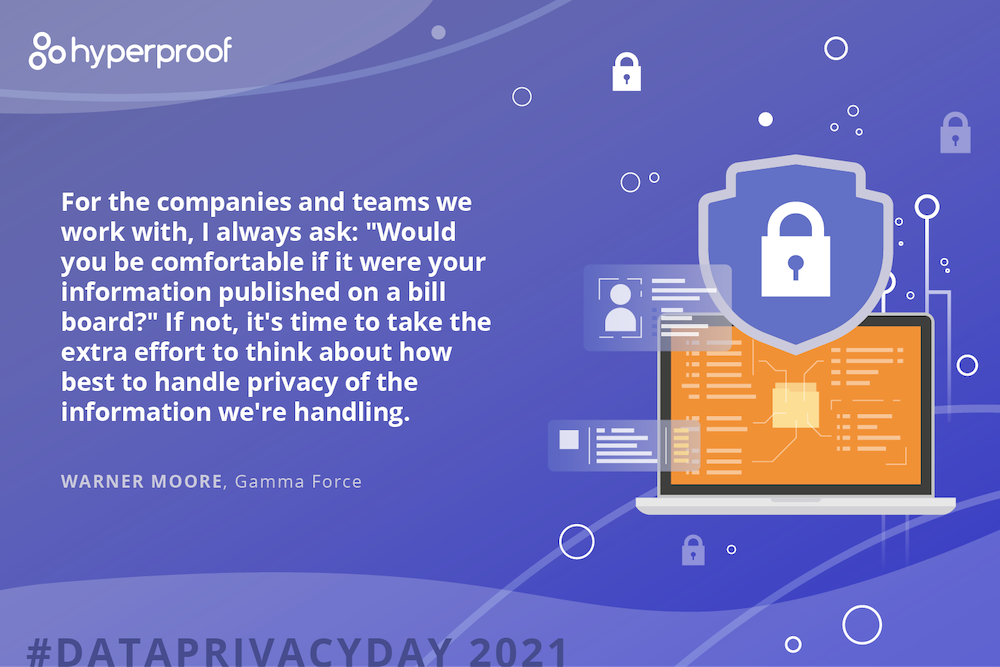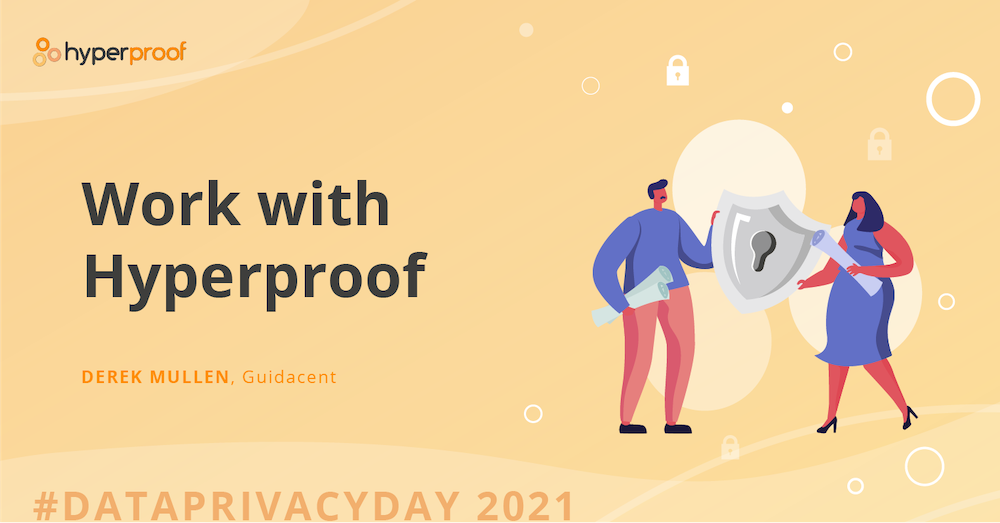Celebrate Data Privacy Day with Advice from Top Data Privacy Experts
Tomorrow, January 28, is Data Privacy Day! Data protection is a large part of our work at Hyperproof, so you know that even if we aren’t in the office yet, all of us here are more than remotely excited for it (that’s the last pun I’ll make, I promise). We want to celebrate with you too—so we asked our partners network to share some advice to commemorate the day. But first, do you know why the day began?
Data Privacy Day (or Data Protection Day in Europe) recognizes the importance of data privacy and data best practices. It also commemorates the signing of Convention 108, the first legally-binding international treaty for privacy and data protection, which took place on the same day 40 years ago in Strasbourg, France. And while much has changed since then, the principle behind the day still stands: protecting data is more crucial than ever.
The Data Privacy Landscape Today
With the dramatic increase in use of technology and remote work due to the COVID-19 pandemic, the past year has led to a lot of changes to the data privacy landscape. HR departments had to figure out how to strike a balance between protecting employees’ health (through collecting personal information for contact-tracing) and maintaining employees’ privacy rights. CISOs across the world struggled to implement secure work-from-home policies and procedures to keep valuable data safe from cyberattacks. Many workers have shifted to using corporate virtual private networks to access secure documents—networks that cybercriminals quickly found ways to exploit. This increase of cyberattacks on remote workers led the FBI and Cybersecurity Infrastructure Security Agency (CISA) to issue multiple warnings throughout last year.
For better or worse, the effects of the virus are likely here to stay. The group of people who thought we would return to the office soon continues to shrink. About one-third of HR executives now believe 40% or more of their workforce will work remotely 12 months post pandemic, according to a survey by The Conference Board. This means that the data privacy challenges COVID-19 has heightened won’t be alleviated any time soon.
Related: How COVID-19 is Changing Compliance Operations and How CISOs Should Respond
Changing Policies
The data privacy landscape I mentioned earlier seems to paint a lot of doom and gloom, but in many ways it could actually have some good, outlasting benefits. There has been a lot of attention drawn to how our data is handled, and criticism given when major companies haven’t met security and privacy standards. For example, Zoom was under intense scrutiny last year for its weak encryption strategy, causing the company to launch a 90-day security revamp.
Politically, many Americans are looking for whether the U.S. will pass its own version of the General Data Protection Regulation (GDPR), a regulation that the European Union implemented to protect the privacy of EU citizens. This seems increasingly likely now that President Joe Biden has taken office, where his past involvement in the Obama administration included a Consumer Privacy Bill of Rights. In addition, Vice President Kamala Harris’ has also historically pushed for more data protection. During her tenure as California’s Attorney General, she introduced the California Online Privacy Protection Act (CalOPPA). This was later followed by the well-known California Consumer Privacy Act (CCPA).
In other states, proposals during the general election demonstrated that consumers are pining for more legal protection of their privacy. States like Massachussetes, where a new measure promised increased privacy protections for vehicle data, passed easily with 75% of voters. Michigan also voted to pass legislation that would require a warrant for electronic data searches, making it the 13th state to include data privacy protections within its state constitution.
New legislation—while being positive for both businesses and consumers—may be difficult for organizations to adjust to with current resources. Even prior to the pandemic, companies have been struggling to stay compliant with current laws and regulations. A Hyperproof survey of over 1,000 IT and compliance professionals found that 61% of respondents’ organizations have experienced a data breach or a privacy violation within the last three years. If this sounds like you, let us know and we’ll be more than happy to help your organization stay continuously compliant.
Advice from Hyperproof’s Partners for Data Privacy Day
Hyperproof partners with professional service firms that hold expertise in cybersecurity, data privacy, and compliance. To celebrate Data Privacy Day, we asked them to provide one piece of advice to tech companies about managing data privacy in 2021. Here’s what some of them said.
Privacy is about respect:

Use privacy to attract customers:

How to know what should be protected:

How to manage data privacy:

While that last one may seem scripted, I can assure you that it was submitted unprompted. Our partners are just as excited and passionate about helping organizations build and maintain solid data privacy measures as we are! It’s a great community to be a part of—and we’re grateful to play a role in helping organizations protect their data every day.
If you’re interested in checking out Hyperproof for yourself, you can get a free personalized demo here:
See how much time and money your compliance team can save with Hyperproof.

Just because Data Privacy Day only comes once a year doesn’t mean we’ll stop publishing content to help your team keep data safe. Sign up for our newsletter to stay up to date on when new resources become available.
The post Celebrate Data Privacy Day with Advice from Top Data Privacy Experts appeared first on Hyperproof.
*** This is a Security Bloggers Network syndicated blog from Hyperproof authored by Hyperproof Team. Read the original post at: https://hyperproof.io/resource/data-privacy-day-tips-from-professionals/



